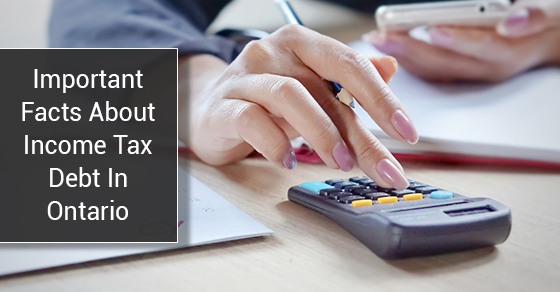It is tax season in Ontario and the dealing with unexpected Income Tax debt can be overwhelming.
Here are 5 things every person should know about Income Tax and Income Tax debt:
-
Not filing your taxes on time will only make matters worse.
Even if you can’t pay the amount you owe to CRA, filing your return on time will help you avoid significant penalty fees. As of 2017 tax year, filing penalties start the day after the tax deadline with an immediate 6%. Then there is a monthly non-filing penalty on the balance 2%.It is also very important to understand that if a taxpayer files late twice with penalties within a four year period, the penalties double.
-
A different deadline for filing self-employed tax returns does not mean a different deadline to pay amounts owing.
Taxpayers who are self-employed technically have until June 15th 2018 to file their taxes (which is 1.5 months more then a regular tax filer) but it is important to understand that even though the return date is later, the deadline to pay any amount owning without interest is still April 30th 2018. Revenue Canada interest rates are compounded daily and can quickly get out of hand so it is important to understand that they start on May 1.
-
You can be held personally responsible for Corporate income tax debt.
As a director or a corporation you are personally responsible for some of your corporation’s tax debt. A failure to file or pay a company’s corporate income tax can cause Revenue Canada to go after your personal bank accounts and assets.
-
Revenue Canada does not go to court to garnishee your wages or seize your bank account and assets.
The CRA can register your debt with the Federal Court of Canada and once registered it has the same effect as a judgement obtained against you. You are normally not notified of this and if you are you will received very little notice. This means that you must pay the amount in full, and if you do not, the CRA may seize assets and property to try and pay our outstanding debt.
-
Income tax debt can be included in a bankruptcy, proposal, or consumer proposal.
If you file a bankruptcy or a consumer proposal as soon as you know you can’t afford to pay the CRA what they are owed you can eliminate the tax debt and stop Revenue Canada from registering a lien against your home or going after other assets and bank accounts. The sooner you deal with the problem the faster you can avoid CRA selling your assets.
Are debt problems keeping you awake at night? Are you are struggling to make your monthly minimum credit card payments, loan payments, Revenue Canada debt payments? Are you worries about losing your house, car, or investments?
Contact a debt counselling professional today at 1-888-329-5198 to eliminate the stress of Revenue Canada debt.

